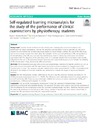Identificador persistente para citar o vincular este elemento:
https://accedacris.ulpgc.es/jspui/handle/10553/73943
| Título: | Self-regulated learning microanalysis for the study of the performance of clinical examinations by physiotherapy students | Autores/as: | Medina Ramírez, Raquel Irina Álamo Arce, Daniel David Rodríguez de Castro, Felipe Cecilio-Fernandes, Dario Sandars, John Costa, Manuel J. |
Clasificación UNESCO: | 321311 Fisioterapia | Palabras clave: | Assessment Process Clinical Skills Health Student Physical Therapy Techniques Self-Regulated Learning |
Fecha de publicación: | 2020 | Publicación seriada: | BMC Medical Education | Resumen: | Students require feedback on their self-regulated learning (SRL) processes to improve the performance of clinical examinations. The key SRL processes used by students can be identified by SRL-micro-analysis but, this method has not been previously applied to physiotherapy students. The aim of this pilot study was to test a research design that might allow the evaluation of the potential usefulness of SRL microanalysis for the identification of key SRL processes used by physiotherapy students during the performance of a clinical examination skill. The objectives of the pilot study were: 1) to evaluate whether SRL-microanalysis could identify differences in the use of SRL processes between successful and unsuccessful students; 2) to evaluate the reliability of SRL microanalysis ratings produced by different assessors. METHODS: SRL-microanalysis was used with second year physiotherapy students of a Spanish university (n = 26) as they performed a goniometric task. The task required students to obtain a goniometric measurement of the shoulder joint of a peer. Two assessors evaluated student performance and conducted the SRL- microanalysis with all students. An analysis of inter-rater reliability was performed to evaluate the degree of agreement between assessors. RESULTS: The SRL-microanalysis revealed differences in the use of key SRL processes between successful (n = 15: 57.0%) and unsuccessful performers (n = 11: 43.0%): The differences were particularly evident in strategic planning and self-monitoring skills. There was good inter-rater reliability for scoring of strategic planning (k = 0.792), self-monitoring (k = 0.946) and self-evaluation (k = 0.846). CONCLUSION: The use of SRL microanalysis characterized the key SRL processes of physiotherapy students performing a clinical skill with reliability between the assessors. This pilot study supports the potential usefulness of SRL-microanalysis for the identification of key SRL processes in physiotherapy education. Therefore, this study paves the way to the development of a full study, with a larger number of students and more diverse clinical tasks, to evaluate the SRL processes in successful and unsuccessful students. | URI: | https://accedacris.ulpgc.es/handle/10553/73943 | ISSN: | 1472-6920 | DOI: | 10.1186/s12909-020-02149-7 | Fuente: | BMC medical education [EISSN 1472-6920], v. 20 (1), 233, (Julio 2020) |
| Colección: | Artículos |
Citas SCOPUSTM
9
actualizado el 08-jun-2025
Citas de WEB OF SCIENCETM
Citations
8
actualizado el 08-feb-2026
Visitas 5
57
actualizado el 11-ene-2026
Descargas
80
actualizado el 11-ene-2026
Google ScholarTM
Verifica
Altmetric
Comparte
Exporta metadatos
Los elementos en ULPGC accedaCRIS están protegidos por derechos de autor con todos los derechos reservados, a menos que se indique lo contrario.
